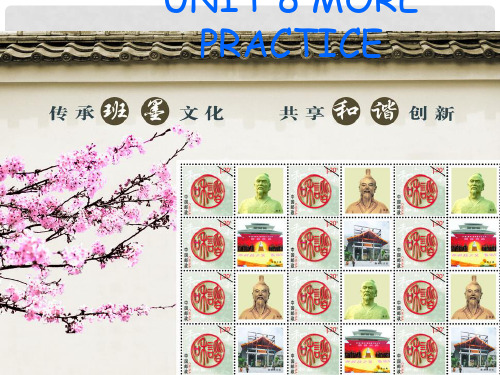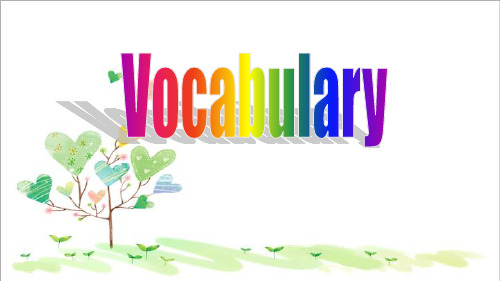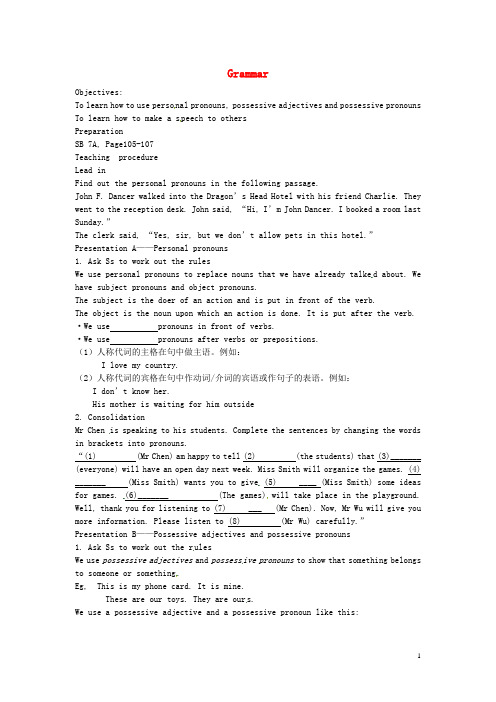广东省广州市花都区赤坭中学七年级英语上册 Unit 8 Vocabulary课件 牛津深圳版
- 格式:ppt
- 大小:327.52 KB
- 文档页数:17


七年级上册英语unit8知识点七年级上册英语Unit 8知识点Unit 8主要讲述了有关职业和工作的话题,此单元的短语、单词和句子结构较为固定,掌握好这些词汇和句式可以帮助我们更好地表达职业和工作方面的内容。
一、职业类单词1. doctor - 医生2. nurse - 护士3. farmer - 农民4. teacher - 教师5. musician - 音乐家6. artist - 艺术家7. actor - 演员8. writer - 作家9. engineer - 工程师10. architect - 建筑师11. chef - 厨师二、做某个工作的相关短语1. be a doctor/nurse/teacher/farmer - 当医生/护士/教师/农民2. work as an engineer/architect/artist/actor/writer - 以工程师/建筑师/艺术家/演员/作家的身份工作3. have a part-time job - 有一份兼职工作4. take on a job - 承担一个工作5. resign from a job - 辞职6. get fired from a job - 被解雇三、句型1. What do you want to be when you grow up? 当你长大后你想成为什么?2. I want to be a teacher. 我想成为一名教师。
3. How much do you earn? 你挣多少钱?4. I earn $10 an hour. 我一个小时挣10美元。
5. What does your dad do? 你爸爸做什么工作?6. He is a doctor. 他是一名医生。
本单元知识点的重点在于词汇和句型的掌握,透过学习职业方面的话题,我们可以更加全面地了解不同职业的名称和相关表达方式,更能够应对生活和工作中的职业方面的语言交流需求。

七年级英语上unit8知识点Unit 8: Travel and ExcursionsAs a seventh-grade student, you’re likely starting to gain a greater interest in traveling and exploring the world around you. If that’s the case, then you’re in luck! Unit 8 of your English textbook is all about travel and excursions. Here are some essential knowledge points you need to know for this unit:I. Vocabulary1. Transport: Different ways to get from one place to another, such as cars, buses, trains, planes, etc.2. Excursion: A short trip or outing made for leisure purposes.3. Accommodation: Places where travelers can stay overnight, such as hotels, hostels, and guesthouses.4. Sightseeing: The activity of visiting places of interest as a tourist.5. Destination: A place where someone is going or planning to go.II. Grammar1. Present continuous tense: Used for talking about actions happening now or in the near future.Example: I am packing my bags for my trip tomorrow.2. Past simple tense: Used for talking about actions that happened in the past.Example: We visited the Grand Canyon last summer.3. Modal verbs: Used for expressing ability, possibility, permission, or obligation.Example: I can speak Spanish fluently.III. Conversation1. Asking for directions.Example: Excuse me, can you tell me how to get to the museum?2. Making a hotel reservation.Example: Hi, I’d like to make a reservation for a room from June 1st to June 5th.3. Ordering food in a restaurant.Example: I’d like to order the spaghetti carbonara, please.IV. Reading1. Travel brochures: These contain information about destinations, attractions, and accommodations.2. Itinerary: A plan or schedule of activities for a trip.3. Packing tips: Suggestions for what to bring on a trip, such as clothes, toiletries, and electronics.V. Writing1. Postcard: A short message sent from a traveler to a friend or family member back home. It should include information about the traveler’s location, activities, and feelings.Example: Hi Mom and Dad, I’m having a great time in Paris! The Eiffel Tower is amazing. Wish you were here with me.2. Travel journal: A personal record of a traveler’s experiences, observations, and emotions during a trip.Example: Day 1: Arrived in Tokyo and checked into the hotel. Went to a sushi restaurant for dinner and tried some new dishes. Feeling excited to explore the city tomorrow.Overall, Unit 8 of your English textbook will help you learn essential vocabulary and grammar for traveling and excursions. You will also practice important conversation, reading, and writing skillsthat will be helpful for communicating in English during your own trips. Bon voyage!。


Unit 8 Environmental ProtectionPart A: ReadingTextEnvironmental ProtectionEnvironmental protection is important for our health and the health of our planet. We can help protect the environment by doing many things.One way to protect the environment is to reduce, reuse, and recycle. We should reduce the amount of waste we produce. We can do this by buying less stuff, using things for longer, and repairing them when they break. We should also reuse things whenever possible. For example, we can use old clothes to make cleaning cloths. And we should recycle as much as we can. We can recycle paper, plastic, metal, and glass.Another way to protect the environment is to save energy. We can do this by turning off lights whe n we leave a room, unplugging electronics when we’re not using them, and taking shorter showers. We can also save energy by using public transportation, walking, or biking instead of driving.We can also protect the environment by conserving water. We can do this by taking shorter showers, fixing leaky faucets, and watering our lawns less often. We can also conserve water by using rainwater to water our plants.Finally, we can protect the environment by planting trees. Trees help to clean the air and provide oxygen. They also help to prevent soil erosion and flooding.By doing these things, we can help to protect the environment and make our planet a healthier place to live.Part B: Vocabulary1.protect (v.): to keep safe from harm or danger2.environment (n.): the surroundings in which a person, animal, or plant lives3.health (n.): the state of being well and free from illness or injury4.reduce (v.): to make something less in size, amount, or degree5.reuse (v.): to use something again6.recycle (v.): to convert waste materials into usable materials7.save (v.): to keep or set aside for future use8.energy (n.): the ability to do work9.conserve (v.): to use wisely and carefully10.water (n.): a clear, colorless liquid that falls from the sky as rain, snow, or hail11.plant (v.): to put a seed or young plant in the ground so that it will grow12.tree (n.): a large woody plant with a trunk and branches13.air (n.): the mixture of gases that surrounds the Earth14.oxygen (n.): a colorless, odorless, tasteless gas that is necessary for life15.soil (n.): the loose material that covers the surface of the Earth and in whichplants grow16.erosion (n.): the process of wearing away of the surface of the Earth by theaction of water, wind, or ice17.flooding (n.): the covering of land with waterPart C: Grammar1.Present Simple TenseThe present simple tense is used to talk about things that happen regularly or are always true.Examples:•We produce a lot of waste.•We should reduce the amount of waste we produce.•We can recycle paper, plastic, metal, and glass.•We can save energy by turning off lights when we leave a room.•We can conserve water by taking shorter showers.2.Present Continuous TenseThe present continuous tense is used to talk about things that are happening now or will happen in the near future.Examples:•I am planting a tree in my backyard.•We are working on a project to clean up the beach.•They are recycling cans and bottles.3.Future TenseThe future tense is used to talk about things that will happen in the future. Examples:•We will reduce our carbon footprint.•We will use renewable energy sources.•We will live in a sustainable way.Part D: ConversationA: Hi, John. I’m glad to see you.B: Hi, Mary. I’m glad to see you too.A: I’m really worried about the environment.B: Me too. I’ve been reading a lot about it lately.A: I know. It’s really scary.B: But there are things we can do to help.A: Like what?B: Well, we can reduce, reuse, and recycle.A: That’s a good idea. I’m already doing that.B: We can also save energy and conserve water.A: I’m not really sure how to do that.B: It’s actually pretty easy. You can turn off lights when you leave a room, unplug electronics when you’re not using them, and take shorter showers. You can also water your lawn less often and use rainwater to water your plants.A: Those are all great ideas. I’m going to start doing those things right away.B: I’m glad to hear that. Every little bit helps.A: I know. We need to do everything we can to protect our planet.B: I agree.。

GrammarObjectives:To learn how to use perso nal pronouns, possessive adjectives and possessive pronounsTo learn how to make a s peech to othersPreparationSB 7A, Page105-107Teaching procedureLead inFind out the personal pronouns in the following passage.John F. Dancer walked into the Dragon’s Head Hotel with his friend Charlie. Theywent to the reception desk. John said, “Hi, I’m John Dancer. I booked a room last Sunday.”The clerk said, “Yes, sir, but we don’t allow pets in this hotel.”Presentation A——Personal pronouns1. Ask Ss to work out the rulesWe use personal pronouns to replace nouns that we have already talke d about. Wehave subject pronouns and object pronouns.The subject is the doer of an action and is put in front of the verb.The object is the noun upon which an action is done. It is put after the verb.·We use pronouns in front of verbs.·We use pronouns after verbs or prepositions.(1)人称代词的主格在句中做主语。
Unit8 词汇篇____________________________________________________________________________________________________________________________________________________________________1.熟练掌握重点单词、词组的用法2.理解并运用关于生日、节日及日程安排的表达1. when adv. 什么时候,引导特殊疑问句,其结构为“When+一般疑问句?”。
When可以对年、月、日以及时刻进行提问或者询问某一动作发生的时间。
回答时常用at, in, on等表示时间的介词短语。
(1)在年、月份前用介词in;在泛指的上午、下午、晚间用介词in(2)在具体某日前用介词on;在星期前用介词on;在具体的某一天的上午、下午或晚上用on(3)在具体的时间点前用介词at2. happy adj. 幸福的,愉快的,高兴的。
Marina was a confident, happy child. 玛丽娜是个自信、快乐的孩子。
反义词: unhappy adj. 不快乐的,悲伤的He was a shy, sometimes unhappy man. 他是一个腼腆的人,有时候还很忧郁。
相关句型: Happy New Year! 新年快乐!Happy Children’s Day! 儿童节快乐!3. how old 意为“多大年纪,几岁”,是用来询问年龄的疑问词组。
其中old为形容词,指年龄。
其句型结构为“How old+be+主语?”,表示“……几岁/多大了?”,答语常用句型为“主语+be+基数词+y ear(s) old.”,也可以直接说年龄。
4. party n. 晚会;聚会。
have a party 举办晚会。
5. school trip学校郊游。
trip可数名词,意为“旅游;旅行”,尤指短途游玩或有目的的旅行。
7年级8单元单词及词组测试练习第八单元英翻汉:(55)1. when (疑问副词)____________adv.2. birthday ____________n.3. month ____________n.4. January ____________n.5. February____________n.6. March ____________n.7. April ____________n.8. May ____________n.9. June ____________n.10. July ____________n.11. August____________n.12. September____________n.13. October____________n.14. November____________n.15. December____________n.16. tenth ____________num.17. fourth ____________num.18. fifteenth ____________num.19. second ____________num.20. third ____________num.21. fifth ____________num.22. sixth____________num.23. seventh____________num.24. eighth _______________25. ninth____________.26. eleventh____________27. twelfth ____________28. thirteenth ____________29. fourteenth _____________30. sixteenth _____________.31. seventeenth _____________.32. eighteenth _____________33. nineteenth_____________34. twentieth _____________35. thirtieth_____________36. date n._____________37. happy adj_____________38. Happy Birthday _____________39. birth n._____________40. age n._____________41. old adj._____________42. how old _____________43. speech n._____________44. contest n_____________45. party n._____________46. trip n._____________47. basketball game _____________48. volleyball game _____________49. school day _____________指非假日)50. art n._____________51. festival n.(音乐,芭蕾舞,戏剧等之)_____________52. Chinese n._____________adj._____________53. music n._____________54. year n._____________年55. year(s) old ……_____________第八单元汉翻英:(55)1_______________(疑问副词)什么时候;何时adv.2. ______________ 生日n.3. ______________ 月;月份n.4. ______________ 一月;正月n.5. ______________ y 二月n.6. ______________ 三月n.7. ______________ 四月n.8. ______________ 五月n.9. ______________ 六月n.10. ______________ 七月n.11. ______________ 八月n.12. ______________ 九月n.13. ______________ 十月n.14. ______________ 十一月n.15. ______________ 十二月n.16. ______________ 第十num.17. ______________ 第四num.18. ______________ 第十五num.19. ______________ 第二num.20. ______________ 第三num.21. ______________ 第五num.22. ______________ 第六num.23. ______________ 第七num.24. ______________ num.第八25. ______________ num.第九26. ______________ num.第十一27 ______________ num.第十二28. ______________ num.第十三29. ______________ num.第十四30. ______________ num.第十六31. ______________ num.第十七32. ______________ num.第十八33. ______________ num.第十九34. ______________ num.第二十35. ______________ num.第三十36. ______________ n.日期37. ______________ adj.愉快的;高兴的;满意的38. ______________ 生日快乐!39. ______________ n.出生;出世;诞生40. ______________ n.年龄;年纪41. ______________ adj.年岁的;年老的;年长的42. ______________ 多大年纪;几岁43. ______________ n.演说;讲演;说话;言论44. ______________ n.竞争;竞赛;比赛45. ______________ n.晚会46. ______________ n.旅途;观光旅行(通常短程)47. ______________ 篮球赛48. ______________ 排球赛49. ______________ 学校上课日(指非假日)50. ______________ n.艺术;美术;艺术品51. _____________ n.(音乐,芭蕾舞,戏剧等之)节,节日52. ______________ n.中文,中国人adj.中国的,中国人的53. ______________ n.音乐54. ______________ n.年55. ______________ ……岁(年龄)。